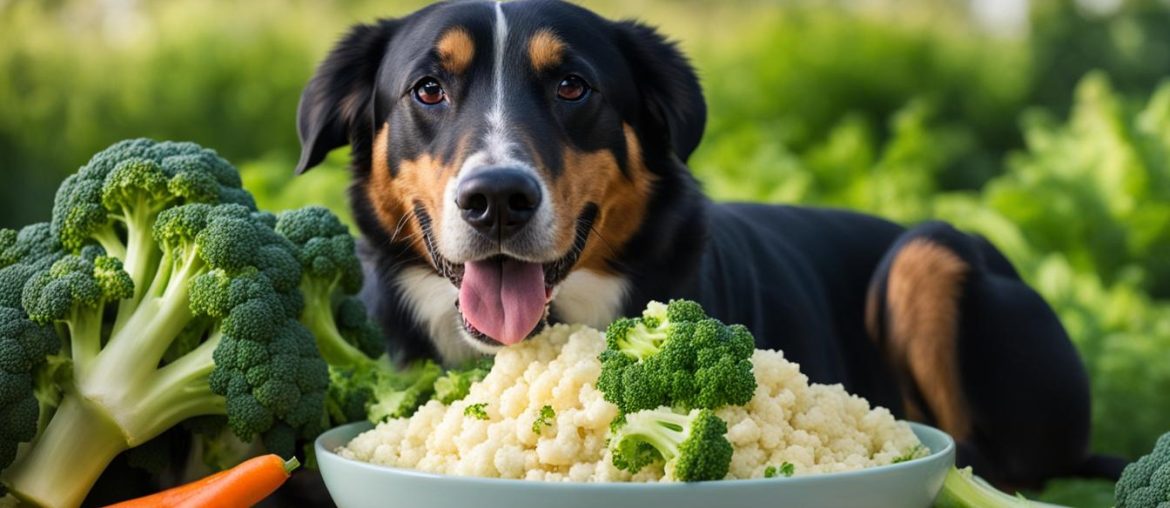As a professional copywriting journalist, I am here to provide you with a comprehensive guide on whether dogs can eat cauliflower rice. Many dog owners are curious about including this nutritious vegetable in their pet’s diet, and I will address all the important factors to consider.
Key Takeaways:
- Dogs can eat cauliflower rice in moderation as part of a balanced diet.
- Cauliflower provides fiber, vitamins, and minerals beneficial to dogs.
- Caution should be exercised to avoid overfeeding and monitor any digestive issues.
- Consulting a veterinarian is always recommended for personalized dietary advice for dogs.
Nutritional Benefits of Cauliflower for Dogs
Cauliflower is a cruciferous vegetable that offers several health benefits for dogs. It is a good source of dietary fiber, vitamin K, and vitamin C. The fiber promotes a healthy digestive system, while vitamins K and C support blood clotting, bone metabolism, and immune function. Including cauliflower, including cauliflower rice, in a dog’s diet can provide them with essential nutrients.
Here is a breakdown of the nutritional benefits of cauliflower for dogs:
- Fiber: Cauliflower is rich in fiber, which aids in digestion and promotes a healthy bowel movement for dogs.
- Vitamin K: This vitamin plays a crucial role in blood clotting and bone health. Cauliflower provides dogs with a natural source of vitamin K, supporting their overall well-being.
- Vitamin C: Known for its immune-boosting properties, vitamin C is also found in cauliflower. Including this vegetable in a dog’s diet can help strengthen their immune system.
Please be aware that while cauliflower is a beneficial addition to a dog’s diet, it should be served plain and unseasoned. Any added seasonings or ingredients can be harmful to dogs and should be avoided.
Table: Nutritional Content of Cauliflower
| Nutrient | Amount per 100g of Cauliflower |
|---|---|
| Calories | 25 |
| Protein | 2g |
| Fat | 0.3g |
| Carbohydrates | 5g |
| Dietary Fiber | 2g |
| Vitamin C | 48.2mg |
| Vitamin K | 15.5mcg |
As seen in the table above, cauliflower is a low-calorie vegetable that provides dogs with essential nutrients. Incorporating cauliflower or cauliflower rice into their diet can contribute to their overall health and well-being.
Risks and Considerations of Feeding Cauliflower Rice to Dogs
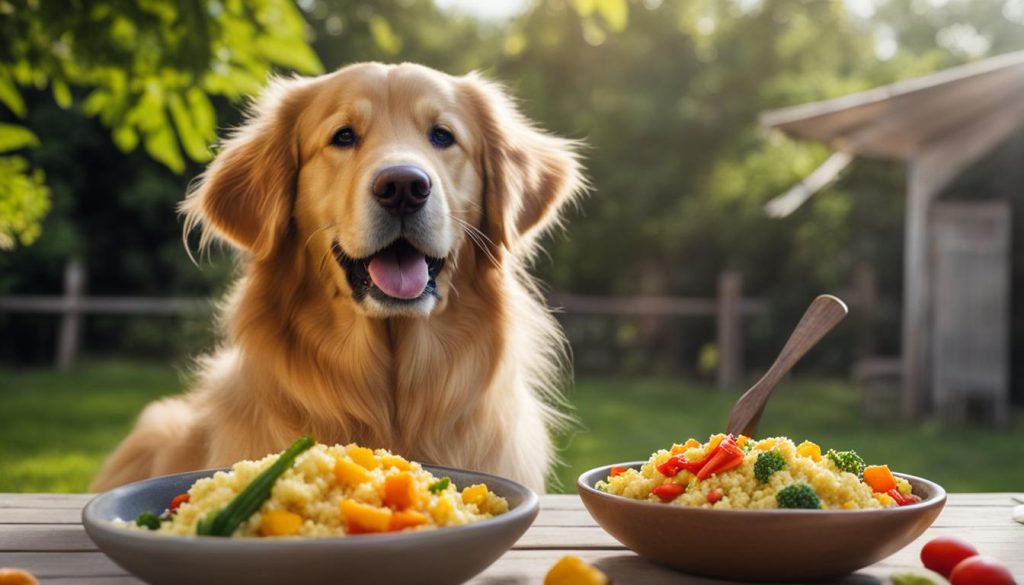
While cauliflower rice is generally safe for dogs, it’s important to be aware of the potential risks and considerations involved. Although cauliflower is a nutritious vegetable, feeding it to dogs in excessive amounts or without proper preparation can lead to digestive issues. Dogs may experience gas and bloating if they consume too much cauliflower or cauliflower rice.
When introducing cauliflower rice into a dog’s diet, it’s crucial to start gradually and monitor their digestion for any signs of discomfort. This allows their system to adjust to the new food and helps prevent any adverse reactions. Additionally, cauliflower rice should always be served plain and unseasoned, without any added oils, seasonings, or additives that may be harmful to dogs.
To ensure the safety and well-being of your furry friend, it’s important to consult with a veterinarian before incorporating cauliflower rice into their diet. They can provide personalized advice based on your dog’s specific needs and dietary requirements. Remember, moderation is key when it comes to feeding cauliflower rice to dogs, and it should only be a small part of a balanced diet.
| Risks and Considerations of Feeding Cauliflower Rice to Dogs |
|---|
| 1. Excessive consumption of cauliflower rice can cause gas and bloating in dogs. |
| 2. Start introducing cauliflower rice gradually into their diet and monitor their digestion. |
| 3. Serve cauliflower rice plain and unseasoned, without any additives. |
| 4. Consult with a veterinarian for personalized advice and guidance. |
How to Prepare Cauliflower Rice for Dogs
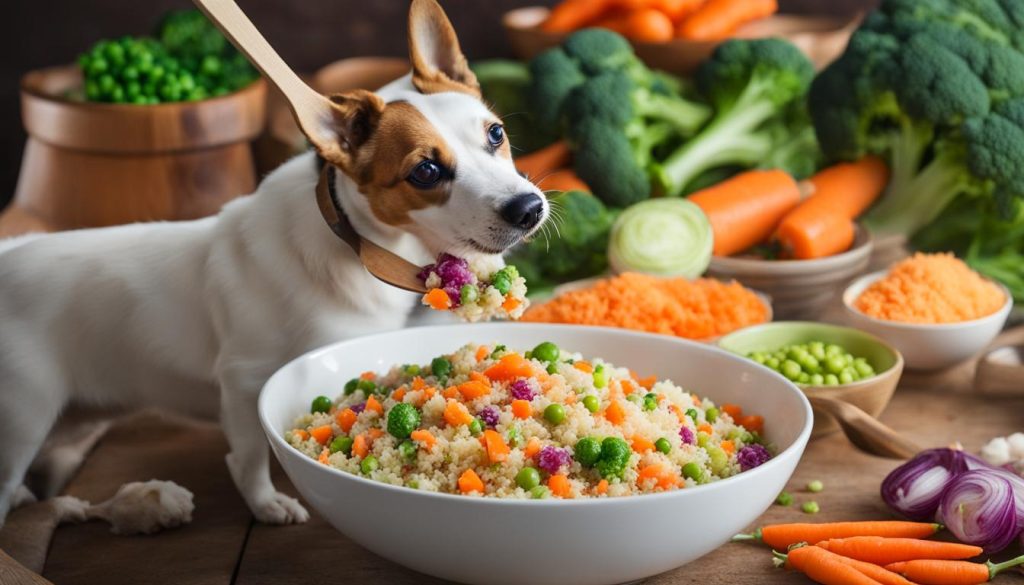
Feeding your dog cauliflower rice can be a nutritious and tasty addition to their diet. Here are some simple steps to prepare cauliflower rice specifically for your furry friend:
- Start by washing the cauliflower thoroughly to remove any dirt or debris.
- Remove the leaves and stem from the cauliflower head.
- Cut the cauliflower into small, manageable pieces.
- Pulse the cauliflower pieces in a food processor until they resemble rice grains. Be careful not to overprocess and turn it into a puree.
- At this point, you can serve the cauliflower rice raw or cooked. If cooking, make sure it is plain and unseasoned. Steaming or boiling the cauliflower until tender is a popular cooking method.
- Allow the cauliflower rice to cool before serving it to your dog.
Remember, moderation is key when introducing any new food to your dog’s diet. Cauliflower rice should be served as an occasional treat or mixed with their regular dog food in moderation. Consult with your veterinarian to determine the appropriate portion size and frequency based on your dog’s specific needs.
Benefits of Cauliflower Rice for Dogs
Cauliflower rice offers several health benefits for dogs. It is low in calories and contains essential nutrients such as fiber, vitamins, and minerals. The fiber in cauliflower rice promotes a healthy digestive system, while vitamins support various bodily functions.
Table: Nutritional Content of Cauliflower Rice
| Nutrient | Amount per 100g |
|---|---|
| Calories | 25 |
| Carbohydrates | 5.3g |
| Fiber | 2g |
| Vitamin C | 48.2mg |
| Vitamin K | 15.5mcg |
Cauliflower rice is a healthy and nutritious option for dogs. It can provide them with essential nutrients while adding variety to their diet. Just make sure to serve it plain and unseasoned, and monitor your dog’s digestion for any potential issues.
By following these simple steps and considering the nutritional benefits, you can safely incorporate cauliflower rice into your dog’s meals. Remember to always consult with your veterinarian for personalized dietary advice and to ensure a balanced diet for your four-legged friend.
Other Healthy Vegetable Options for Dogs
While cauliflower is a nutritious vegetable that dogs can enjoy, there are other healthy vegetable options that can be incorporated into their diet as well. These vegetables provide additional nutrients and variety to their meals. Here are some safe vegetables for dogs:
- Broccoli: Rich in vitamins and antioxidants, broccoli can be given to dogs in small, bite-sized pieces. It is a good source of fiber and can support their digestive health.
- Carrots: Carrots are a crunchy and low-calorie vegetable that dogs love. They are high in beta-carotene, which is converted to vitamin A in the body and promotes good vision.
- Green beans: Green beans are a great source of vitamins and minerals for dogs. They are low in calories and can be served as a healthy snack or mixed with their regular food.
- Sweet potatoes: Sweet potatoes are packed with fiber, vitamins, and antioxidants. They can be cooked and mashed for easy consumption or sliced into treats and baked.
These vegetables can be served to dogs in moderation, either raw or cooked. It’s important to introduce new vegetables gradually into their diet and observe any digestive changes or allergies. If you have any concerns or questions about specific vegetables, it is always best to consult with your veterinarian.
Table: Nutritional Comparison of Safe Vegetables for Dogs
| Vegetable | Nutritional Benefits | Serving Size |
|---|---|---|
| Broccoli | High in vitamins, antioxidants, and fiber. | Small, bite-sized pieces |
| Carrots | Rich in beta-carotene, fiber, and low in calories. | Sliced or grated |
| Green beans | Good source of vitamins and minerals, low in calories. | Raw or cooked |
| Sweet potatoes | Packed with fiber, vitamins, and antioxidants. | Cooked and mashed or sliced into treats |
Considerations for Serving Cauliflower Leaves to Dogs
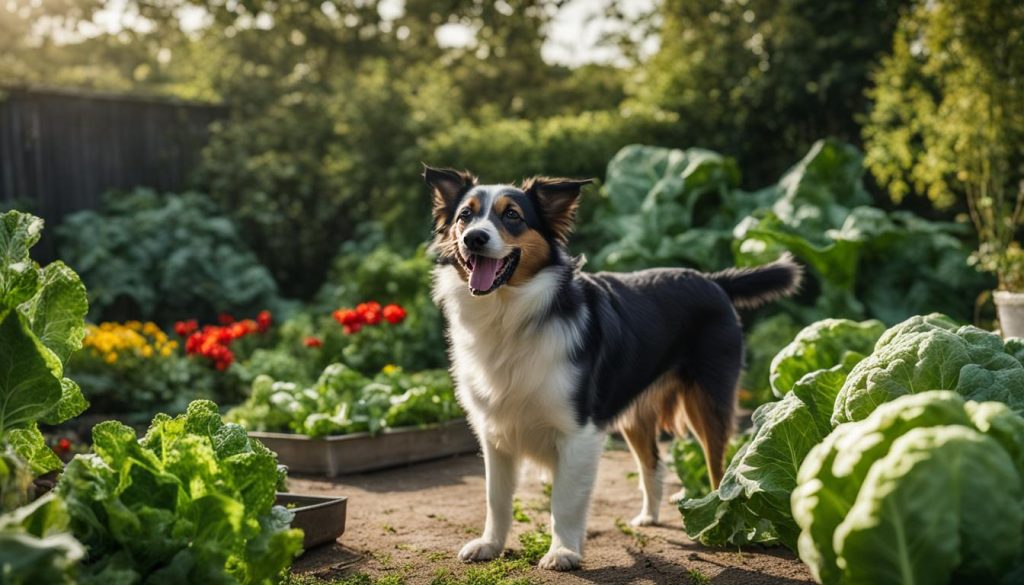
Cauliflower leaves can be a safe and nutritious addition to a dog’s diet. These leaves contain essential vitamins, minerals, and protein that can contribute to their overall health. However, it is important to take certain considerations into account when serving cauliflower leaves to dogs.
Firstly, it is crucial to wash the cauliflower leaves thoroughly before serving them to dogs. This helps to remove any dirt or potential contaminants that may be present on the leaves. Additionally, it is recommended to chop the leaves into manageable pieces to prevent choking hazards, especially for smaller dogs.
Cauliflower leaves can be served either raw or cooked. Some dogs may prefer the taste and texture of cooked leaves, while others may enjoy the crunchiness of raw leaves. It is important to observe your dog’s preferences and monitor their digestion when introducing cauliflower leaves into their diet.
However, it is important to note that cauliflower leaves should be considered as a treat and not a replacement for a balanced meal. While they offer nutritional benefits, including vitamins and minerals, they should be served in moderation. Always consult with a veterinarian to determine the appropriate portion size and frequency of serving cauliflower leaves to your dog.
Exploring Cauliflower Cheese for Dogs
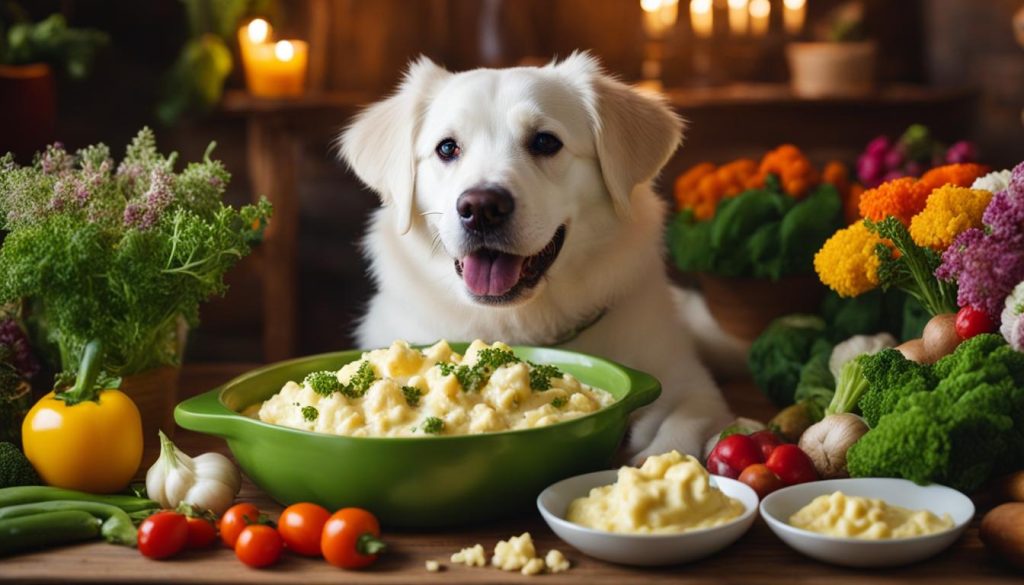
When it comes to cauliflower cheese, can dogs indulge in this popular dish? While dogs can eat cauliflower cheese in small amounts, it’s important to exercise caution. Some dogs may be lactose intolerant, so it’s crucial to monitor any adverse reactions after feeding them cauliflower cheese. Additionally, it’s vital to avoid using garlic, onions, or other seasonings that are toxic to dogs when preparing cauliflower cheese.
Feeding cauliflower cheese to dogs should only be done in moderation as an occasional treat. The rich and creamy nature of cauliflower cheese can be enticing, but it’s crucial to remember that it should not be a regular part of a dog’s diet. The best approach is to offer a small taste to see if the dog enjoys it and reacts well.
To ensure the safety and well-being of your furry friend, consult with a veterinarian before introducing cauliflower cheese into their diet. They can provide personalized advice based on your dog’s specific needs, health condition, and dietary requirements. By working closely with a veterinarian, you can make informed decisions and ensure that any treats, including cauliflower cheese, are given in a way that promotes your dog’s health and happiness.
Caution with Cauliflower Pizza for Dogs
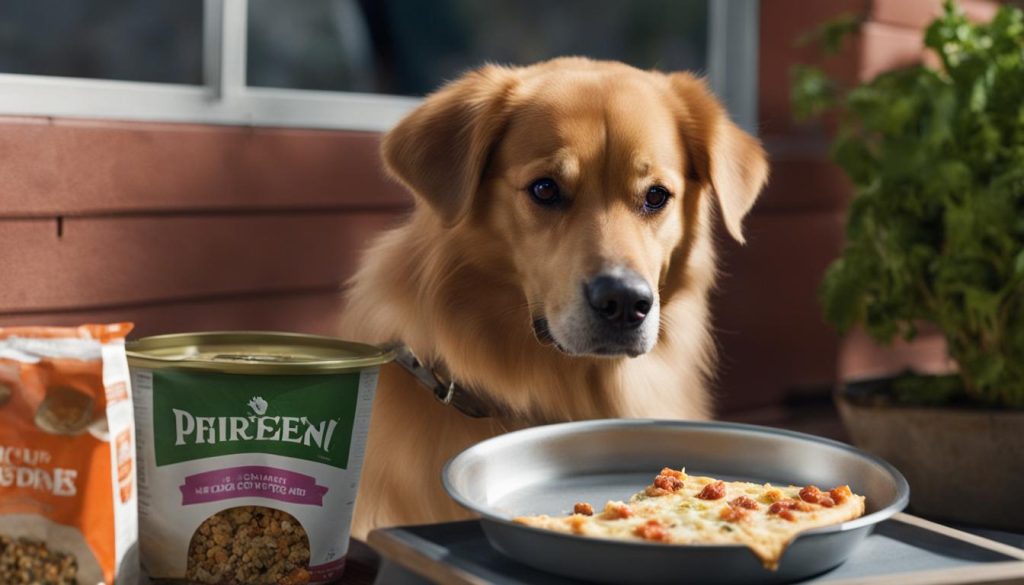
While cauliflower is safe for dogs, cauliflower pizza is not recommended for them. Most cauliflower pizza contains seasonings, oils, and toppings that may not be suitable for dogs. These ingredients can cause digestive issues or allergic reactions. It is best to avoid feeding cauliflower pizza to dogs and stick to plain cauliflower or cauliflower rice instead.
Feeding cauliflower pizza to dogs can introduce potential health risks due to the ingredients commonly used in its preparation. Garlic and onions, which are often found in pizza toppings or seasonings, are toxic to dogs and can lead to anemia. The high fat content in pizza cheese and oils can cause gastrointestinal problems, including indigestion and pancreatitis. Additionally, the gluten in pizza crust can be difficult for dogs to digest and may trigger allergies or sensitivities.
It is important to prioritize the well-being of our furry friends and avoid feeding them foods that could harm their health. While cauliflower pizza may be a popular choice for humans seeking a healthier alternative, it is not suitable for dogs. Instead, opt for plain cauliflower or cauliflower rice as a nutritious addition to their diet. Always consult with a veterinarian for personalized dietary advice regarding your dog’s specific needs and health condition.
The Risks of Cauliflower Pizza for Dogs
| Risks | Effects on Dogs |
|---|---|
| Garlic and onion | Toxicity, anemia |
| High fat content | Gastrointestinal problems, indigestion, pancreatitis |
| Gluten | Difficult digestion, allergies, sensitivities |
Moderation and Monitoring for a Balanced Diet
When it comes to feeding our canine companions, maintaining a balanced diet is essential for their overall health and well-being. While cauliflower rice can be a nutritious addition to a dog’s diet, it should be given in moderation and alongside their regular dog food. It’s important to remember that cauliflower rice should only make up a small portion of their overall caloric intake.
To ensure a balanced diet for dogs, it’s recommended to consult with a veterinarian. They can provide personalized guidance based on your dog’s specific needs, age, size, and any underlying health conditions. A veterinarian can help determine the appropriate portion size and frequency of feeding cauliflower rice to your furry friend.
Monitoring your dog’s digestion and overall well-being is crucial when introducing new foods into their diet, including cauliflower rice. Start by offering a small amount and watch for any signs of digestive discomfort or allergic reactions. If your dog experiences gas, bloating, or other adverse reactions, it’s best to discontinue feeding cauliflower rice and consult with a veterinarian for further guidance.
The Importance of Consulting a Veterinarian
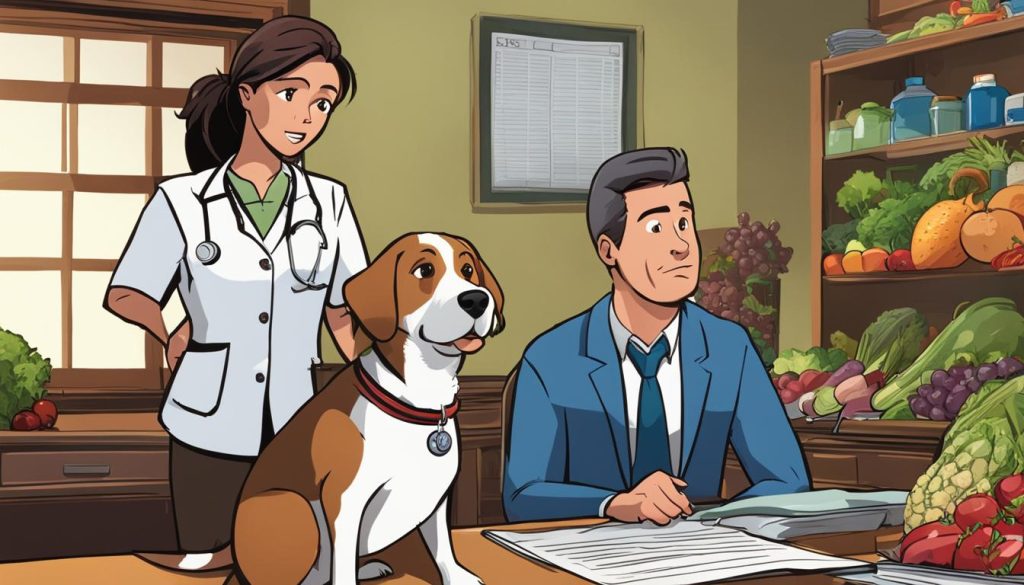
When it comes to the health and well-being of our furry friends, it’s always best to seek professional advice. That’s why consulting a veterinarian is crucial before introducing any new food, including cauliflower rice, into a dog’s diet. Veterinarians have the knowledge and expertise to provide personalized advice based on your dog’s specific needs, health condition, and dietary requirements.
A veterinarian can assess your dog’s overall health and determine whether cauliflower rice is suitable for them. They can recommend the appropriate portion size and frequency of feeding cauliflower rice to ensure a balanced diet. Furthermore, they can address any concerns or questions you may have regarding the safety and potential risks associated with feeding cauliflower rice to your dog.
By consulting a veterinarian, you can make informed decisions about your dog’s diet and ensure their nutritional needs are met. They can guide you on how to incorporate cauliflower rice or any other food into your dog’s meals in a way that promotes their health and well-being. Remember, every dog is unique, and what may be safe and nutritious for one dog may not necessarily be the same for another. That’s why professional advice is invaluable when it comes to feeding your furry companion.
Benefits of Veterinarian Guidance
- Personalized advice based on your dog’s specific needs
- Assessment of your dog’s overall health and dietary requirements
- Determination of appropriate portion sizes and feeding frequency
- Addressing concerns and questions regarding safety and potential risks
- Guidance on incorporating cauliflower rice or other foods into your dog’s meals
Remember, your veterinarian is your partner in ensuring the health and well-being of your dog. Their expertise and guidance can help you make the best choices for your furry friend’s diet.
Wrapping Up
To summarize, can dogs eat cauliflower rice? Yes, dogs can eat cauliflower rice in moderation as part of a balanced diet. Cauliflower is a nutritious vegetable that provides fiber, vitamins, and minerals, making it a healthy addition to a dog’s diet.
However, it is important to note that while cauliflower rice is generally safe for dogs, proper preparation and serving are crucial. Cauliflower rice should be served plain and unseasoned to avoid any potential health risks for dogs. It is also important to introduce cauliflower rice gradually into their diet and monitor their digestion for any discomfort.
Remember, is cauliflower rice safe for dogs? Yes, as long as it is served in moderation and prepared properly. Consult with a veterinarian to determine the appropriate portion size and frequency of feeding cauliflower rice to ensure a balanced diet for your furry friend.
Ultimately, while cauliflower rice can be a healthy option for dogs, it is essential to consider individual dietary needs, consult with a veterinarian, and maintain a balanced overall diet to keep your canine companion happy and healthy.
FAQ
Can dogs eat cauliflower rice?
Yes, dogs can eat cauliflower rice in moderation as part of a balanced diet.
What are the nutritional benefits of cauliflower for dogs?
Cauliflower provides fiber, vitamins, and minerals that promote a healthy digestive system, blood clotting, bone metabolism, and immune function in dogs.
Are there any risks or considerations when feeding cauliflower rice to dogs?
Dogs may experience gas and bloating if they consume too much cauliflower or cauliflower rice. It should be introduced gradually and served plain and unseasoned.
How do I prepare cauliflower rice for dogs?
Wash and chop the cauliflower, then pulse it in a food processor until it resembles rice grains. Serve it raw or cooked, but avoid any seasonings or additives.
What are some other healthy vegetable options for dogs?
Broccoli, carrots, green beans, and sweet potatoes are safe and nutritious options for dogs.
Can dogs eat cauliflower leaves?
Yes, dogs can eat cauliflower leaves. Wash them thoroughly, chop into manageable pieces, and serve as a treat.
Can dogs eat cauliflower cheese?
Cauliflower cheese can be fed to dogs in small amounts, but caution should be exercised as some dogs may be lactose intolerant. Avoid using garlic, onions, or other toxic seasonings.
Is cauliflower pizza safe for dogs?
No, cauliflower pizza is not recommended for dogs as it may contain seasonings, oils, and toppings that can cause digestive issues or allergic reactions.
How much cauliflower rice should I feed my dog?
Cauliflower rice should only be a small part of a balanced diet for dogs. Consult with a veterinarian for personalized portion size and frequency.
Should I consult a veterinarian before feeding cauliflower rice to my dog?
Yes, it is important to consult with a veterinarian before introducing any new food into a dog’s diet, including cauliflower rice. They can provide personalized advice based on the dog’s specific needs and health condition.


